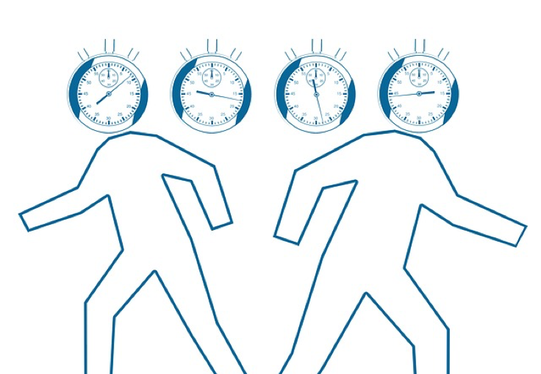 If you’ve been swearing more in the past year or so — even at work — you’re not alone. The corporate and financial research platform Sentieo recently combed through a database of around 9,000 conference call transcripts looking for expletives. They found 166 transcripts that contained them from 2021. That's a significant jump from previous years. Just 104 transcripts contained profanity in 2020, 112 in 2019, and 92 in 2018. So swearing at work appears to be up. Frustration with the pandemic and a work-from-home informality may both be factors in the rise of swearing. Our question: Is cutting loose with language always a bad thing? Experts quoted in Inc. say “not necessarily.” Michael Adams, author of In Praise of Profanity, argues that swearing has many useful social functions including “bringing us together.” There’s an intimacy to profanity precisely because it is somewhat taboo. "Bad words," Adams writes, "are unexpectedly useful in fostering human relations because they carry risk.... We like to get away with things and sometimes we do so with like-minded people." Adams believes that swearing can also help us appear slightly more vulnerable and more authentic — both useful qualities in relationship building. No one is suggesting you begin your next Zoom meeting by imitating a drunken pirate. But for those who are savvy enough to navigate delicate situations, an occasional swear word, science attests, may have genuine utility. Have you ever uttered swear words at work, and how do you feel when co-workers do so? To join the conversation, click "comments" above just below the picture — we'd love to hear your thoughts!
2 Comments
 Anxious about returning to the office? Join the club. After over a year of remote work, many of us are feeling overwhelmed at the prospect of returning to live work and seeing co-workers on-site rather than on-screen. Writing in the Harvard Business Review, Alice Boyes, PhD, clinical psychologist and author of The Anxiety Toolkit, says the idea of getting back to the office might feel surprisingly difficult. Transitions often tend to spike our anxiety; we typically feel anxious about resuming anything we’ve avoided, even if that “avoidance” was externally imposed. Additionally, in the post-pandemic world, personal relationships and boundaries may have shifted. For example, you may be concerned about who is or isn’t vaccinated and who does or doesn’t observe health and safety protocols. Boyes suggests that we all “be intentional about retaining the best parts of WFH (work from home) and office-life.” Working from home was a vast experiment, and it probably taught you a lot about what helps or harms your productivity. It likely also taught you a great deal about how you communicate most effectively. Holding on to any beneficial habits might prove to be a challenge when your environment changes—but being conscious of them is a first step. Beyond that, she adds, “You’ll need to establish these habits almost from day one, as if they were completely new habits. This is because habits need consistent cues, and the cues you had at home will likely no longer be present, at least not in the same way.” What concerns do you have about returning to the office, and how are you preparing for this transition? To join the conversation, click "comments" above.  Self-reliance is a quintessential American value, but it can be taken too far. At one time or another, everyone could use some help at work, though many are reluctant to ask. (Tweet it!) Speaking to The New York Times , social psychologist Heidi Grant, author of the book Reinforcements: How to Get People to Help You, called the ability to ask for help “a learnable skill.” Although it is a skill we seldom think about, it can have a profound impact on our goals and lives. The good news: People want to help. A 2008 study from Cornell found that subjects “underestimated by as much as 50 percent the likelihood that others would agree to a direct request for help.” The key is:
If you would like to read more about creating a habit around masterful communication, check out our book: Be Quiet, Be Heard: The Paradox of Persuasion  Being called on unexpectedly during a meeting can be uncomfortable or even embarrassing. But it doesn’t have to be either. In fact, it can be an opportunity to excel. (Tweet it!) Writing in The Harvard Business Review, Paul Axtell, author of the book Meetings Matter, says, ”Instead of hoping your boss or the person leading the meeting won’t put you on the spot, prepare yourself for this unexpected opportunity to shine.” His advice:
-- “I don’t have that information, but it’s important and I will get it to you.” -- “I want to be sure that I understand your main concern. Is it…?” -- “Did I answer your question, or would you like to follow up?” Have you ever been put on the spot in a meeting? How did you handle it? To join the conversation, click "comments" above. If you would like to read more about creating a habit around masterful communication, check out our book: Be Quiet, Be Heard: The Paradox of Persuasion  What would happen if psychologist Abraham Maslow were to construct his famous Hierarchy of Needs pyramid with regard to the contemporary workplace? Top Facebook executives, in collaboration with Wharton professor Adam Grant, wanted to find out. After examining hundreds of thousands of employee survey answers, they identified three big buckets of needs: career, community, and cause. Career is about the what of work: having a job that provides autonomy, allows us to use our strengths, and promotes learning and development. Career gives us motivation. (Tweet it!) Community is about the who of work: feeling connected, respected, cared about, and recognized. Community gives us a sense of belonging. Cause is about the why of work: feeling that we make a meaningful impact, identifying with our organization’s mission, and believing that it does some good in the world. Cause gives us pride and purpose. Writing in the Harvard Business Review Grant and the Facebook team commented, “These three buckets make up what’s called the psychological contract — the unwritten expectations and obligations between employees and employers. When that contract is fulfilled, people bring their whole selves to work. But when it’s breached, people become less satisfied and committed. They contribute less. They perform worse.” Do you resonate with these needs? Are they being met at your workplace or, if not, what should change? To join the conversation, click "comments" above. If you would like to read more about creating a habit around masterful communication, check out our book: Be Quiet, Be Heard: The Paradox of Persuasion.  For teams to succeed, their members must feel safe. Studies show that psychological safety allows for openness, moderate risk-taking, and creativity (Tweet it!). In order to achieve breakthroughs, people need to take chances—but that won't happen if they fear rejection or ridicule. Writing in the Harvard Business Review, Laura DeLizzona, PhD, an instructor at Stanford University, notes that one of the best strategies for making co-workers feels safe—and therefore innovative and productive—is to replace blame with curiosity. “If team members sense that you’re trying to blame them for something, you become their saber-toothed tiger,” she says. While blame leads to defensiveness and disengagement, curiosity indicates a learning mindset. Maybe you don’t have all the facts, so:
If you would like to read more about creating a habit around masterful communication, check out our book: Be Quiet, Be Heard: The Paradox of Persuasion  We typically try to identify other people’s emotions through their facial expressions—eyes in particular. Eye contact is certainly critical in empathy, and many psychologists use the “Reading the Mind in the Eyes” exercise (where you detect subtle shifts in the looks people give you) to test empathy in their experiments. (http://socialintelligence.labinthewild.org/mite/) But The Washington Post reports that a new study by Michael Kraus of the Yale School of Management has found that our sense of hearing may be even stronger than sight when it comes to accurately detecting emotion. Kraus found we are more accurate when we hear someone’s voice than when we look only at their facial expressions, or see their face and hear their voice simultaneously. In other words, you may be able to sense someone’s emotional state even better over the phone than in person (Tweet it!). In several follow-up studies, Kraus focused on the reason why the voice—especially when it is the only cue—is such a powerful mode of empathy. Participants were asked to discuss a difficult work situation over a video conferencing platform, using either just the microphone or the mic and video. They were more accurate at detecting each other’s emotions in voice-only calls. When we only listen to voice, he found, our attention for subtleties in vocal tone increases. We simply focus more on the nuances we hear in the way speakers express themselves. So how can we get better at interpreting emotions in voices? The human ability to perceive nuances in voices is extremely sophisticated, research shows. But as with other communication skills, paying attention is key. The more you focus on audio cues, the more you will learn. Can you think of a situation where you were able to “read” important emotional information through someone’s voice alone? To join the conversation, click "comments" above. If you would like to read more about creating a habit around masterful communication, check out our book: Be Quiet, Be Heard: The Paradox of Persuasion  Senior managers and team leaders are increasingly frustrated by conflicts arising from multi-teaming—having their people assigned to multiple projects simultaneously. Multi-teaming can create efficiencies and limit downtime, but the continual churning of members can weaken group cohesion and identity, making it harder to build trust and resolve issues (Tweet it!). Moreover, individuals may experience stress, fatigue, and burnout as they struggle to manage time and engagement across projects. Managers must stay on top of the situation in order to mitigate downsides. Writing in The Harvard Business Review, Heidi Gardner, faculty chair of the Accelerated Leadership Program at Harvard Law School, and Mark Mortensen, chair of the Organizational Behavior Area at INSEAD, suggest best practices based on their 15-year study of team collaboration: · Launch each team well to establish trust and familiarity · Map everyone’s skills · Manage time across teams · Create a learning environment · Boost motivation The authors write, “A sense of fairness drives many behaviors. If people feel they are pulling their weight while others slack off, they quickly become demotivated. When team members are tugged in many directions, it’s often difficult for each one to recognize and appreciate how hard the others are working. As the leader, keep publicly acknowledging various members’ contributions…” Have you worked across multiple teams or shared your team members with others? What best practices do you suggest; what caveats can you offer? To join the conversation, click "comments" above. If you would like to read more about creating a habit around masterful communication, check out our book: Be Quiet, Be Heard: The Paradox of Persuasion.  Most organizations—sports teams, universities, Fortune 500 companies—focus on rewarding individual performance. They reward the most productive individuals rather than the most effective groups. Writing in Harvard Business Review, Professor Jay Van Bavel of NYU and Professor Dominic Parker of Lehigh University, both scientists at the Neuroleadership Institute, contend that leaders in these organizations are overlooking something fundamental about human nature—our tribalism (Tweet it!). “Group identity can explain a range of remarkable behaviors, from putting in long hours at work to making the ultimate sacrifice for one’s country,” they note. “Many experiments have now shown that members will act to benefit their groups, even when doing so exacts a personal cost. One reason is because we share in the success and rewards of our in-group members—we bask in reflected glory and feel pleasure when a team member succeeds. To help cultivate a positive group identity, Van Bavel and Parker recommend that leaders reward behavior that advances the goals of the organization, rather than the individual. Effective leaders, they say, provide bonuses, recognition, raises, flexibility, and opportunities based on an entire team’s performance. To avoid free-riding (team members shirking personal responsibility), they suggest giving individual rewards to individuals who make important contributions to a team’s success, i.e. “unsung heroes who work late, cover for colleagues, and enhance the success of the group.” Combining individual and collective rewards, they conclude, promotes stronger group identity and ensures that individual members are encouraged and motivated (both financially and socially) to pursue team goals and help the group succeed. If you work as part of a team, how are your team’s members rewarded? Do you see areas for improvement with regard to rewards and incentives? To join the conversation, click "comments" below on our Community of Practice Forum. If you would like to read more about creating a habit around masterful communication, check out our book: Be Quiet, Be Heard: The Paradox of Persuasion.  Want to find an ideal team player? Patrick Lencioni, author of The Five Dysfunctions of a Team and The Ideal Team Player, suggests a three-trait cluster to be on the lookout for (Tweet it!) . In a Forbes interview he says a great team player is:
What makes humble, hungry, and smart people powerful and unique “is not the individual attributes themselves, but rather the required combination of the three,” Lencioni explained. Think of the best people on your team—do you consider them humble, hungry, and smart? How can you tell? To join the conversation, click "comments" below on our Community of Practice Forum. If you would like to read more about creating a habit around masterful communication, check out our book: Be Quiet, Be Heard: The Paradox of Persuasion  Over the years, we’ve cited research showing that employees who have the power to make decisions and implement plans are often more satisfied and more productive. This principle applies to teams as well as individuals. The higher a team’s autonomy, the more active learning and the less emotional exhaustion team members report. Group uncertainty about degree of autonomy reduces productivity and effectiveness. This means that independence can devolve into gridlock or chaos if people aren’t clear about their level of authority. To ensure the likelihood of success, managers should balance engagement with enough structure to clarify boundaries and expectations. Joan F. Cheverie, manager of professional development programs at the higher education and IT nonprofit EDUCAUSE, offers advice to managers who want to empower teams: “Stop telling your staff how to do their job and, instead, set the strategic direction, deadlines, and benchmarks and then allow them to determine how to accomplish the job.” David Rock, executive director of the NeuroLeadership Institute, suggests giving employees a framework within which they can make their own choices: “Try defining the end result really clearly,” he writes, “and outlining the boundaries of what behaviors are okay. Then let people create within this frame.” We want to hear: How have you empowered teams to be more autonomous? And how has a team you’ve worked on been empowered? To join the conversation, click "comments" on our Community of Practice Forum. If you would like to read more about creating a habit around masterful communication, check out our book: Be Quiet, Be Heard: The Paradox of Persuasion.  Wharton School of Business professor Adam Grant no longer grades his students on a curve—an evaluation method that pits students against one another, since only a certain number can get A’s. Instead, he offers bonus points on exams if students who do not know an answer themselves can identify which students do know it. Grant, an organizational psychologist who is also the author of the book Give and Take, based his new approach on research, specifically:
Grant wrote in The New York Times: “Essentially, I was trying to build a collaborative culture with a reward system where one person’s success benefited someone else. It was a small offering — two points on a 120-point exam — but it made a big difference. More students started studying together in small groups, then the groups started pooling their knowledge.” We want to hear: Do you believe you perform better in a competitive or collaborative environment? What makes the difference? To join the conversation, click "comments" on our Community of Practice Forum If you would like to read more about creating a habit around masterful communication, check out our book: Be Quiet, Be Heard: The Paradox of Persuasion  Millennials are now the largest generation in the workplace, and will represent nearly 75 percent of the work force by 2030. This influential cohort has some strongly held beliefs about how relationships between employers and employees should be structured. According to Forbes, research shows that Millennials:
What this all adds up to is that Millennials value a workplace that is collaborative and inclusive. Let’s hope that as more and more of them move into leadership positions, they will continue to hold these values and to implement them! We want to hear: If you are a Millennial, what about your work culture is most important to you? If you manage Millennials, what are you doing to inspire them to remain loyal and stay productive? To join the conversation, click "comments" on our Community of Practice Forum. If you would like to read more about creating a habit around masterful communication, check out our book: Be Quiet, Be Heard: The Paradox of Persuasion.  Studies repeatedly show that teams tend to innovate, solve problems, and spot mistakes faster than individuals—and that people working in teams report higher job satisfaction. But what kind of team do you think performs best? A. A team whose members—each an expert in their own area—speak strictly on their area of expertise, eschew sidebar chitchat, and part right after meetings; or B. A mixed team of executives and middle managers whose members contribute an equal amount, who are attuned to one another's communication nuances, and who hang around after meetings to chat about their personal lives. Five years ago, Google became focused on constructing the ideal team. Its “Project Aristotle” scrutinized everything about the interactions of a vast number of the company’s teams and reviewed a half-century of academic studies. In the end, Project Aristotle researchers concluded that understanding and influencing group norms were the keys to improving Google’s teams—and that successful teams shared the norms of “conversational turn-taking” (over time, everyone speaks an equal amount) and high “social sensitivity” (members were skilled on intuiting how one another felt based on voice tone, facial expressions, and other non-verbal cues). Long story short: If you have a chance to create or participate in a team, opt for Team B. Team A may be filled with high performing individuals, but the problems is that they remain individuals. Their team norms discourage equal speaking, and there are few exchanges of the sort of personal information that let teammates pick up on what people are leaving unsaid. We want to hear: Are you part of a team that resembles Team A or Team B? What do you see as its advantages or disadvantages? To join the conversation, click "comments" on our Community of Practice Forum. If you would like to read more about creating a habit around masterful communication, check out our book: Be Quiet, Be Heard: The Paradox of Persuasion.  More companies are embracing daily micro-meetings—a.k.a. "huddles" or "check-ins"--as a way of keeping colleagues in sync. A business practice long used everywhere from Capital One to the Ritz-Carlton, huddles got a boost in the small-business community from Verne Harnish, who called them a “must” for growth companies in his 2002 book Mastering the Rockefeller Habits. Short daily meetings, says Harnish, keep companies focused on strategic goals, ensure timely answers to pressing questions, and enforce accountability because everyone knows who is doing what. A recent Inc. article describes huddles as “too streamlined to irk even hard-core meeting grouches” because they use the following ground rules: • They last no longer than 15 minutes • They begin on time • They prohibit “problem solving” Beyond this, huddles are customizable: They can occur at any agreed upon time of day; they can follow a formulaic agenda or be more improvisational; they can include all staff or key leaders. "If you're a small organization, not doing this is crazy," says Patrick Lencioni, author of Death by Meetings. "When you're small, you can develop connections among staff that make you more nimble. Daily check-ins help you build a culture of unity and sustain it as you grow." We want to hear: Does your organization use huddles, and what do you see as their benefits? If not, Do you think their addition might be valuable? To join the conversation, click "comments" on our Community of Practice Forum. If you would like to read more about creating a habit around masterful communication, check out our book: Be Quiet, Be Heard: The Paradox of Persuasion. |
Archives
July 2024
Categories
All
|
|
Glaser & Associates, Inc.
Executive Offices 1740 Craigmont Avenue, Eugene, OR 97405 541-343-7575 | 800-980-0321 [email protected] |
© 2019 Glaser & Associates. All Rights Reserved.


 RSS Feed
RSS Feed